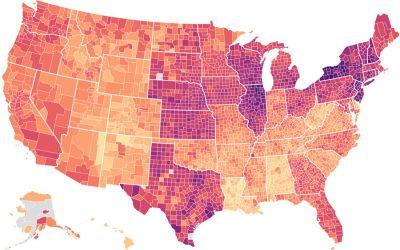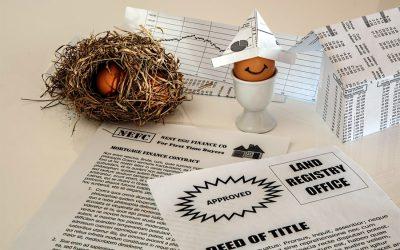
Ever hear that “real estate investors pay next to nothing in income taxes”?
While not true, real estate investors do enjoy sweeping tax deductions. From writing off most closing costs to maintenance and repairs, landlord insurance to rent default insurance, property taxes to property management fees, landlord tax deductions include every conceivable expense. Including some paper expenses that they don’t actually incur year-to-year, such as rental property depreciation.
This oft-misunderstood tax deduction saves real estate investors thousands of dollars on their taxes. Play your cards right, and you can compound this tax savings by using them to buy ever more investment properties and keep snowballing your passive income.
But how is rental property depreciation calculated? How does it work? As you plan out your investing tax strategy, here’s what you need to know about rental property depreciation, including a free rental property depreciation calculator.
Free Rental Property Depreciation Calculator
Knowing a property’s depreciation value helps make investment decisions. If you know you can depreciate a property say $5,000 a year, it makes it a lucrative investment. You know you can knock $5,000 off the top of your income, and when combined with other deductions, may leave you with little to no tax liabilities.
This rental property depreciation calculator helps you make fast decisions by seeing the depreciation amount instantly.
How Is Rental Property Depreciation Calculated?
Depreciation is one of the few real estate tax deductions that doesn’t reflect a “true” cost you incurred. For example, you can write off property repair costs — but you had to actually come out of pocket for them.
You don’t pay depreciation each year, it’s simply part of your purchase price. Rental property depreciation schedules allow you to deduct the cost of the building itself, but not all at once in a single year. You spread the deductions out evenly over 27.5 years.
Many rental property owners even show a loss on their tax returns when they actually earned strong real estate cash flow, but the deprecation lowered their taxable income enough that they show a loss.
Start with Your Cost Basis
Before you can figure out your deprecation, you must know your original cost basis. It starts with the home’s purchase price but does not include the land value.
For example, if you buy a property for $200,000, but the land is worth $30,000, you may only use $170,000 for your cost basis for depreciation purposes.
To the property sale price, you may add allowable fees. This includes closing costs and capital improvements you made to the home. The more fees/costs you add to the purchase price, the higher your cost basis becomes. A higher cost basis allows more deprecation.
Closing costs you may include to increase your cost basis include:
-
- Attorney costs as they pertain to the property purchase
- Survey fees
- Recording fees
- Title search and insurance costs
- Transfer taxes
- Debts you assume from the seller and pay
You may also depreciate the cost of capital improvements you make over the course of your ownership. Capital improvements include any property updates that extend the usable life of the property or improve its value. You add the cost of these improvements to the cost basis above (property price minus land value). The IRS calls this the “marked-up” or adjusted cost basis.
Examples of depreciable capital improvements include:
-
- A new roof
- Adding a room
- Replacing the flooring
- Renovating the garage or basement
- Installing new mechanical systems (e.g. electrical wiring or HVAC)
“Normal” home maintenance and repair costs don’t affect your cost basis. You write them off in your normal operating expenses, so you get the deduction in the same year, rather than spreading it out over time using a rental property depreciation schedule.
Rental Property Depreciation Schedule
Since you spread the depreciation deduction over 27.5 years, you take the cost basis of the building (not the land!) and divide it by 27.5 years to calculate your annual depreciation amount. That comes to 3.636% of the building’s cost basis, that you can deduct each year for the next 27.5 years.
Note that residential properties follow straight-line depreciation. That makes the calculations simpler, as the deduction remains the same each year (other than the first and last years). If your really want your eyes to cross, read more details on the IRS’s various Modified Accelerated Cost Recovery System (MACRS) depreciation methods here.
In the first year, you prorate the depreciation amount, based on the number of months you owned the property. You can only deduct partial depreciation for the first year, based on how many months of the year you owned the property, and then take the full year’s depreciation thereafter.
Here’s how much depreciation you can take for the year you buy the property, based on the month when you purchase:
| Month you Bought the Home | Depreciation Percentage |
| January | 3.485% |
| February | 3.182% |
| March | 2.879% |
| April | 2.576% |
| May | 2.273% |
| June | 1.970% |
| July | 1.667% |
| August | 1.364% |
| September | 1.061% |
| October | 0.758% |
| November | 0.455% |
| December | 0.152% |
An Example of Real Estate Depreciation
“This is making my head spin. How is rental property depreciation calculated in real life?”
Time for an example. You bought a home in June for $200,000, with the land valued at $30,000 and the building valued at $170,000. You make $10,000 in capital improvements. Add that to your $170,000 for a building cost basis of $180,000.
Depreciated over 27.5 years, that comes to $6,545 in annual depreciation, and you can deduct a prorated amount of $3,546 in the first year. The annual depreciation comes off the top of your net operating income. Let’s say you bring in $12,000 a year in rental income, but have $4,000 in operating expenses. That leaves you with $8,000 in net income, but you can deduct the $6,545 from the $8,000 for $1,455 in taxable rental income.
Depending on your tax situation, the depreciation write-off may even knock you into a lower tax bracket, creating even more savings.
Then you decide to sell the property after ten years, for $300,000. You owe capital gains taxes on $90,000, as your cost basis is $210,000: purchase price of $200,000 plus $10,000 in capital improvements. Plus you also owe depreciation recapture — at your regular income tax rate, though capped at 25% — on the $62,451 you were allowed to deduct for depreciation ($3,546 from the first year, plus nine years at $6,545/year).
Or you can just our rental property depreciation calculator.
Depreciation Rules for Rental Properties
First, the deprecation rules apply only to investment properties. You can’t depreciate your own home. But you get other deductions and tax breaks for owning a home, such as the primary residence exclusion, plus perks like homeowner financing even when you house hack.
Depreciation only applies to non-owner-occupied income properties. The IRS lets you deduct for the building’s natural decline over time, since it’s a physical structure that deteriorates and loses value over time without maintenance and repairs. You can’t depreciate the value of the land, since it doesn’t deteriorate.
To qualify, you must own the property for longer than one year. If you flip houses, for example, you can’t use depreciation unless you hold onto the property for longer than a year.
If you own an investment home, you may depreciate it for the first 27.5 years or until you sell the home. This works out to 3.636% per year.
Rental Property Depreciation Recapture
Writing off the deprecation feels great — while you own the investment property. Once you sell it, though, the IRS wants their money back, in the form of depreciation recapture tax. You have to pay taxes on the amount you depreciated or were allowed to depreciate.
That latter is worth repeating: even if you don’t actually claim depreciation while owning the rental property, you still owe depreciation recapture on the amount you were allowed to deduct as the depreciation expense. Many real estate investors get this wrong, thinking they don’t owe depreciation recapture if they don’t actually use the tax benefit. The IRS then taxes them twice.
Uncle Sam always wins in the end.
Even so, depreciation still helps property owners in several ways. First, the tax deduction for investment property depreciation comes off your regular income tax. While you do get charged at the ordinary income tax rate (not the capital gains rate) for depreciation recapture, the IRS caps it at 25%, which limits the tax liability for higher earners.
Second, you postpone having to pay taxes to Uncle Sam, penalty-free. In fact, you have many options to avoid capital gains tax on real estate entirely! Among others, you can scale your real estate portfolio tax-free with an investment property 1031 exchange.
If you sell the current rental home and use the money to buy another investment property, you can defer paying capital gains taxes — including investment property depreciation recapture — on the sold property. It’s a complicated process, but in the end, you use all the funds earned from the sale of one investment home to buy another and you avoid the rental property depreciation recapture.
What If You Don’t Take Investment Property Depreciation?
You owe rental property depreciation recapture even if you didn’t claim the deduction when you owned the property.
If you still own the home, you can amend your tax returns. Go back as far as you’ve owned the home and amend each year’s returns to take advantage of the depreciation. You must file 1040X and Schedule E at a minimum, but talk with your tax advisor to make sure.
Final Word
Rental property depreciation marks one of the greatest deductions real estate investors have. If you haven’t taken advantage and you own a rental property, go back and claim what’s yours.
Remember, you must own the rental property for at least one year to deduct for depreciation. Whether you deduct annual depreciation expenses on your tax returns each year or not, you’ll still owe depreciation recapture, so make sure you take it in full each year.
Plan for depreciation recapture taxes but enjoy the write-off in the meantime.♦
Have questions about how rental property depreciation is calculated, or rental property depreciation recapture? Not sure how rental property depreciation schedules work? Ask below!





























What happens if you own a property for 18 years and then refinance to save $50,000 in payments. Refinance is for 15 years. Do you start over at 27.5 years of depreciation or 27.5 depreciation minus 18 years equals 9.5 years of depreciation left. Also add $12,000 in fixing the place up due to bad renters. Can I just write off the $12,000 in one year or at 5 years of depreciation because most of the repairs were not capital improvements, i.e. painting, refinishing wood floors, new windows, tile, respray bath tub etc.
Hi Dale, refinancing does not directly impact rental property depreciation. It could indirectly impact depreciation if you used the money to make capital improvements. As for the property updates after those bad tenants moved out, you’ll have to separate out the “repairs” from the “capital improvements.” I’d talk to an accountant about which exact repairs you made fall under each category.
Great Blog. Thanks for sharing with us. This kind of information very helpful for me & also helps those people who really want to know about property related tactics. Keep updating.
Thanks VS!
What if I convert my home to rental then convert it back to rental – how do I “restart” the depreciation the second time it is a rental?
Sorry – should say “convert my home to rental then back to personal use then back to rental”.
Hi Bari, that’s a question best asked an accounting professional 🙂
My understanding is the 1031 exchange only applies to the capital gain portion of the tax otherwise due when it is sold, not the depreciation recovery. But your article seems to imply otherwise. Did the rules change recently? Please elaborate.
Example:
Purchase price: 1,000,000
Sale price: 1,500,000
Depreciation deducted: 200,000
Tax if no exchange: 500,000 capital gains, 200,000 depreciation recovery
If 1031 exchange, I thought there would be no tax on the 500,000 CG, but I would still pay on the 200,000 dep. recovery.
Is this wrong?
Thanks for your help.
Hi Thomas, with a 1031 exchange you can defer both long-term capital gains tax and depreciation recapture. But definitely speak with an accountant about specific questions, as it gets complex quickly!
Thank you for your reply. Subsequent to my original question I rechecked all the IRS instructions very carefully, and they do seem to agree with your reply. But it is very complicated, as you note. It was many years ago that I went through the instructions and “thought” I understood it at the time.
Great stuff! This will avoid unnecessary financial loss from taxes. Thanks for sharing this with us!
Thanks Allan!
This is great. Many people have no idea how depreciation is calculated. Thanks for sharing.
Thanks Dahos!
This made rental property depreciation clearer and easier. Thanks for sharing!
Glad it was helpful Monica!
I did not know about the depreciation recapture rule and assumed if I didn’t take it then I didn’t owe it so can I catch up 12 years of depreciation in one lump some or claim it when I sell it or how many years can I go back and what happens if the depreciation is more than I owe (I never used deduction and didn’t owe which is why I didn’t use it) do I get a refund on taxes or go towards next year. I can’t afford tax help and just hoping for more info on what tax forms or options to catch up unclaimed depreciation to figure out best strategy if I sell it
How is depreciation on a rental property calculated if only rented out for the first 4 months and then remained empty the rest of the year? Is the full amount of property taxes and home owners insurance also deductible or should these expenses be prorated. The rental remained empty for 8 months out of the year and was not used for personal residence.
Hi Nelson, it still counts as a rental property in that example. You can take the full tax deductions and depreciation.
Hi Nelson, We are a retired couple with 25,000 in income from a pension and DCP distribution and a little interest. We were forced to sell a rental property due to tenants that were destructive. We have about 60,000 in accumulated depreciation. Will our depreciation recapture be calculated on the 25,000 income bracket (12%) or do you add the 60,000 to the 25,000 and use the 85,000 rate? If we do have to add it together, is this what would also be used for the rest of the capital gain? If so, could we use something like an HSA to get into the 0 capital gains rate since it’s pretty close?
My niece and I have coowned a property since 2006 and split the depreciation expense on Schedule E over the last 16 years. She sold her share of the property to me in April 2022.
Question #1 Does my niece complete a Schedule E for 2022?
Question #2: If #1 is yes. Can she deduct depreciation expense in 2022 or no, because that is the year she sold.
Question #3 If #2 is yes, is she entitled to a percentage depreciation carry over to offset rental income in Q1 2022?
Question #4: Now, since I am sole owner, do I continue to use the same depreciation schedule or does it start over? Do I change the basis to include the purchase price and expenses of sale to my niece?
Hi Gay Gay, I hate to evade the question, but these are questions for an accountant. Keep us posted on what you hear from your CPA!